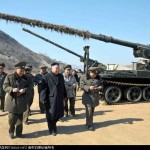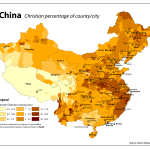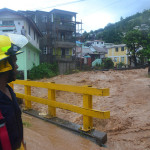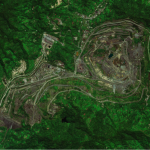- DETERRENCE: Wide-area sensors shrinking as industry looks beyond military
- DPRK: An updated estimate of energy use in the armed forces of the Democratic People’s Republic of Korea
- GOVERNANCE AND CIVIL SOCIETY: Chinese Christians resist government plan to remove crosses
- CLIMATE CHANGE ADAPTATION: A conflict-sensitive approach to climate change mitigation and adaptation in the urbanizing Asia- Pacific
- AUSTRAL PEACE AND SECURITY: PNG: more to Australia than just another point on a star
 DETERRENCE: Wide-area sensors shrinking as industry looks beyond military, James Drew, Flight Global (7 July 2015)
DETERRENCE: Wide-area sensors shrinking as industry looks beyond military, James Drew, Flight Global (7 July 2015)
Hybrid war combines conventional warfare and covert destabilization wherein states use criminal and terrorist networks for smuggling or attacks. US strategy calls for forward-deployed mobile forces and disrupting transregional networks. Hybrid war will be the norm in littoral coastal cities, hinterlands and linked global networks. Wide area aerial video such Redkite may be used to monitor cities.
- Out of the mountains, David Kilcullen, Oxford University Press (2014)
- The national military strategy of the United States of America 2015, US Department of Defense, (June 2015) [PDF, 1MB]
- BeSeTo: An emerging northeast Asian Giga-City? in Global Problems, Complexity, and Civil Society in East Asia, Peter Hayes, Richard Tanter, NAPSNet Special Reports (13 July 2015)
 DPRK: An updated estimate of energy use in the armed forces of the Democratic People’s Republic of Korea (DPRK), David Von Hippel, Peter Hayes, Roger Cavazos, The Nautilus Institute for Security and Sustainability (4 August 2015)
DPRK: An updated estimate of energy use in the armed forces of the Democratic People’s Republic of Korea (DPRK), David Von Hippel, Peter Hayes, Roger Cavazos, The Nautilus Institute for Security and Sustainability (4 August 2015)
North Korea’s recent artillery exchange with South Korea over renewed propaganda broadcasts indicates extreme DPRK sensitivities to certain kinds of information flows. However, South Korean armed forces, apparently in conjunction with US forces, liberalized their rules of engagement and will now fire back. North Korea will have to review their war plans to account for increased fighting. North Korea runs out of fuel or ammunition or both within 30 days of full combat and must accomplish its strategic objectives in an extremely short amount of time.
- Mind the gap between rhetoric and reality, Roger Cavazos, The Nautilus Institute for Security and Sustainability (26 June 2012)
- Propaganda, fire-thrashing, and the risk of North Korean first-use of nuclear weapons in North Korea, Peter Hayes and Roger Cavazos, The Nautilus Institute for Security and Sustainability (10 April 2015)
- Rattling the American cage: North Korean nuclear threats and escalation potential, Peter Hayes and Roger Cavazos, The Nautilus Institute for Security and Sustainability (4 April 2013)
 GOVERNANCE AND CIVIL SOCIETY: Chinese Christians resist government plan to remove crosses, Ian Johnson, New York Times (10 August 2015)
GOVERNANCE AND CIVIL SOCIETY: Chinese Christians resist government plan to remove crosses, Ian Johnson, New York Times (10 August 2015)
Chinese Christians have been protesting the government’s removal of church crosses in the streets and via open letters from government-approved church leaders. Seven church leaders in the province have been arrested after protesting the removals, and another leader was sentenced to a year in prison earlier this year. The crackdown is in line with other similar crackdowns on civil society under the current regime, in the view of some analysts.
- China detains seven Christians opposed to cross demolition, Sui-Lee Wee, Reuters (4 August 2015)
- Christianity in China, Eleanor Albert, Council on Foreign Relations (7 May 2015)
- China ordains first Catholic bishop since 2012 amid tense relationship with Christianity, Christopher Bodeen, Associated Press (5 August 2015)
 CLIMATE CHANGE ADAPTATION: A conflict-sensitive approach to climate change mitigation and adaptation in the urbanizing Asia- Pacific, Ting Zhang, Working Paper 7, The Hague Institute for Global Justice (March 2015) [885 KB, PDF]
CLIMATE CHANGE ADAPTATION: A conflict-sensitive approach to climate change mitigation and adaptation in the urbanizing Asia- Pacific, Ting Zhang, Working Paper 7, The Hague Institute for Global Justice (March 2015) [885 KB, PDF]
‘Climate change can be linked, alongside other factors, to urban violence. This is notwithstanding the multiple pathways and feedbacks between the climate system, natural resources, human security, and society stability. There is broad agreement that in general climate change causes resource scarcity, which may lead to conflicts, and that climate change acts a ‘threat-multiplier’ that intensifies problems and undermines coping capacities, which in turn results in conflict.’
- Land-based climate change mitigation, land grabbing and conflict: Understanding intersections and linkages, exploring actions for change, Carol Hunsberger et al., Working Paper Series No. 1, MOSAIC Research Project (May 2015) [331 KB, PDF]
- Security and climate change, Jon Barnett, Global Environmental Change, vol. 13, issue 1, pp. 7-17 (April 2003) [subscription required]
 AUSTRAL PEACE AND SECURITY: PNG: more to Australia than just another point on a star, John Garnaut, Sydney Morning Herald (14 August 2015)
AUSTRAL PEACE AND SECURITY: PNG: more to Australia than just another point on a star, John Garnaut, Sydney Morning Herald (14 August 2015)
Australia most important strategic interest is Papua New Guinea. Despite and/or because of Australian foreign and military aid, massive resource revenues and corruption, PNG is now a genuinely fragile state. After 10 year war (15-20,000 dead) caused by the environmental disaster of the Panguna mine, Bougainville province is the centre of a three-way conflict between the pro-independence regional government and the national government, both seeking revenues through mine re-opening, and still deeply resistant Panguna locals.
- Bougainville, elections and diplomatic tensions, Late Night Live, Radio National, ABC (19 May 2015)
- Mr. Pip, Official Trailer #1 (2013) – Hugh Laurie Movie HD, YouTube (26 April 2013) (movie directed by Andrew Adamson, from the novel ‘Mister Pip’ by Lloyd Jones)
- Bougainville at a crossroads: independence and the mine, Keri Phillips, Rear Vision, Radio National, ABC (2 June 2015)
The Nautilus Peace and Security Weekly Report presents articles and full length reports each week in six categories: Austral security, nuclear deterrence, energy security, climate change and security, the DPRK, climate change adaptation and governance and civil society. Our team of contributors carefully select items that highlight the links between these themes and the three regions in which our offices are found — North America, Northeast Asia, and the Austral-Asia region.
Subscribe to NAPSNet to receive free weekly email reports.
- Editor: Arabella Imhoff
Contributors:
- Deterrence: Peter Hayes
- DPRK: Roger Cavazos
- Governance and Civil Society: Dyana Mardon
- Climate Change Adapation: Saleem Janjua
- Austral Peace and Security: Richard Tanter

